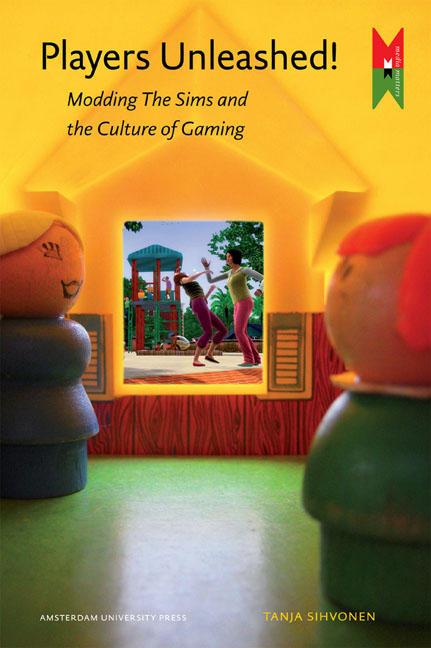V - Extending the Game
Published online by Cambridge University Press: 22 January 2021
Summary
Pleasures and Politics of Simulation
The Sims has generally been labelled a virtual doll's house and a real-life domestic simulator where the player creates and controls the lives of little AI-powered people. These kinds of epithets can be investigated through the concept of simulation, which in this context is regarded as an operating principle that connects the ingame occurrences to the ways players make sense of the real (that is, the actual, social) world. In semiotic terms, simulating real life refers to the subject matter of the simulation, ‘the signified’, whereas reference to, for example, the doll's house gives an idea of the particularities of the signification process and the representational system in question (‘the signifier’). In the context of The Sims, the association between the game (or, the game-as-process) and its referent in reality can fruitfully be investigated through the notion of simulation precisely as the explicitly stated source system of the game is the naturalised, albeit somewhat idealistic construction of the ideologically charged American suburbia that I investigated in the previous chapter.
The Sims can be categorised as an experiential (rather than algorithmic) simulation and a free-form game, deriving from the traditions of the adventure and RPG genres. Its RPG-qualities are most visible in its emphasis on the creation and development of characters and the important roles the characters are assumed to encompass as the player's representational devices. Another characteristic of The Sims that follows from its adventure-RPG-trait is its contextuality, visible in the constant transformation and expansion of the game's context (see Myers 2003, 35). The add-ons of The Sims have brought, for example, ‘The Shopping Centre’, ‘The Old Town’, and ‘The Studio Town’ in new gameplay spaces, as well as a constant flow of new gameplay elements. Although many game scholars rely on the idea of the incompatibility of game elements and the elements of simulation, in the case of The Sims I see these elements providing a multidimensional platform, a predisposition for toying and playing with the notion of reality and real life. As I am interested in ideology, I am also keen on finding out how these ideological propositions are inscribed in the game, and on the other hand, how they are reworked and redirected.
- Type
- Chapter
- Information
- Players Unleashed!Modding The Sims and the Culture of Gaming, pp. 157 - 184Publisher: Amsterdam University PressPrint publication year: 2012



